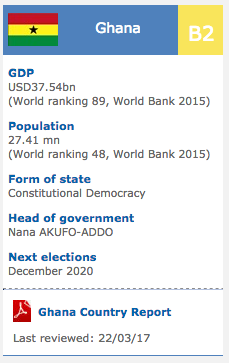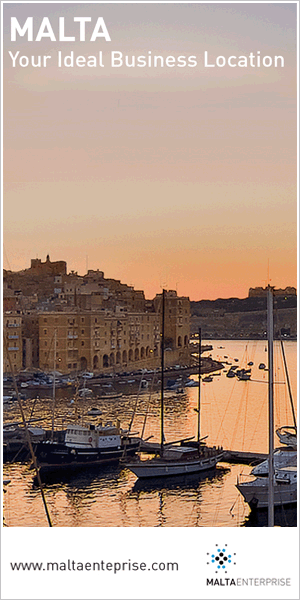France: France Outlook for 2016-17
2015/10/23
The county (France)is situated in Western Europe, bordering the Bay of Biscay and English Channel, between Belgium and Spain, southeast of the UK; bordering the Mediterranean Sea, between Italy and Spain. It has borders with Andorra for 56.6km, Belgium for 620km, Switzerland for 573km, Germany for 451km, Spain for 623km, Italy for 488km, Luxembourg for 73km and Monaco for 4.4km. Land in France is frequently flat plains or gently rolling hills in north and west; remainder is mountainous, particularly Pyrenees in south, Alps in east. French land covers an area of 547030 km
The climate is generally cool winters and mild summers, but mild winters and hot summers along the Mediterranean; occasional strong, cold, dry, north-to-northwesterly wind known as mistral. Frenchman(men), Frenchwoman(women) speak French 100%, rapidly declining regional dialects and languages (Provencal, Breton, Alsatian, Corsican, Catalan, Basque, Flemish).
Overview
France's socialist president, Franois Hollande, will remain in office until 2017. The Parti socialiste (PS) holds a majority in parliament, although a steep fall in the government's approval ratings will constrain reforming ambitions.
The PS parliamentary group should remain united in the near term, but left-wingers could become more fractious during 2014-15 as new austerity measures are introduced. With public debt rising above 93% of GDP in 2013, the government will remain under pressure from financial markets to show that it can deliver sustainable improvements to the public finances.
Amid a stagnant economy, the European Commission has given France until 2015 to reduce the budget deficit below 3% of GDP, conditional upon France accelerating structural reforms. Although this goal appears achievable, the pace of reform is likely to disappoint. Real GDP growth is forecast to pick up in 2014-15. The Economist Intelligence Unit expects a modest recovery, on the assumption of stable conditions in the euro zone in particular, but the need for fiscal austerity will weigh on growth.
We expect the French economy to grow by 1% in 2015 and 1½% in 2016
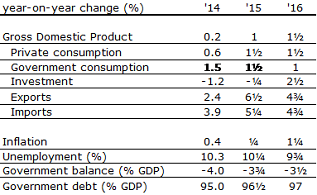 In both years, economic growth will be driven by higher private consumption. In 2015 growth will also benefit from a higher net contribution from exports, while investment growth will pick up in 2016
In both years, economic growth will be driven by higher private consumption. In 2015 growth will also benefit from a higher net contribution from exports, while investment growth will pick up in 2016
Although the French government has already taken action to improve business profitability, further reforms are needed to maintain economic growth in the medium to longer term
Economic growth forecasts
After a strong performance by the French economy at the beginning of this year (quarter-on-quarter (q-o-q) growth of 0.7%) economic growth came to a complete halt in the second quarter (see Figure 1). We expect modest economic growth of 1% in 2015. Economic growth will pick up slightly in 2016, to 1½%.
Private consumption remains up to par
Economic growth in 2015 and 2016 will be driven largely by private consumption. In our forecasts private consumption will continue to grow at a decent pace of 1½% in 2015 and 2016. Employment is rising, which supports private consumption. In addition, the savings rate in France is still high from an international point of perspective (Figure 2). By scaling down on savings, households can maintain their purchasing power. They will however face lower growth in their real disposable income, as inflation will pick up again in 2016 and there is little upward pressure on nominal wages due to slack on the labour market.
Encouraging trade development in 2015
Besides private consumption, a strong increase in exports in 2015 is contributing to French economic growth as a result of the low euro. Export orders are developing quite positively, indicating that export will continue to grow in the near future (see Figure 3). Ultimately, we expect net exports to contribute ¼ percentage points to economic growth in 2015. In 2016, we expect French export and import growth to be roughly balanced.
Investment is lagging due to lack of profitability
Investment has been disappointing so far this year. Investment actually contracted in the second quarter by 0.2% (q-o-q), mainly due to lower investment in the construction sector. One of the reasons for the low investment propensity of the French corporate sector is low profitability. For each euro of total value added by a French company, after payment of wages, tax and transfers (including the contribution from subsidies), only 23 cents remain. This is relatively low (see Figure 4).
The Hollande administration has introduced a package of measures designed to increase investment and employment by French businesses [1].We expect these measures to boost business investments, ultimately resulting in investment growth by 2½% in 2016. Our positive investment expectation is also supported by the steady increase in producer confidence and the recovery of capacity utilisation rates to their long-term average.
Labour market and readiness to reform are weaknesses
With unemployment running at 10.3%, the labour market remains a weakness in the French economy. As a result of government measures mentioned above and the recovery in producer confidence, we expect employment to rise in the upcoming period. This employment growth, however, will be insufficient to offset the unemployment increase during the Great Recession (see Figure 5).
The reforms that have been introduced are probably not enough to revitalise the French economy. The labour and product markets are still too rigid, and the administrative burden and government spending are still too high. At the same time, it is unlikely that the government is prepared to take unpopular measures to address these problems. Hollande faces deep divisions within his own party, and, in addition, there will be regional elections in December and presidential elections in May 2017. The limited readiness to reform combined with weak competitiveness of the French economy have negative implications for the government budget. Without additional policy measures, the government debt ratio will rise further to 97% of GDP in 2016.
Footnote
[1] In 2013 the French government implemented tax measures with the Crédit d'impôt pour la compétitivité et l'emploi (CICE) to reduce wage costs for the industry as a whole. The Pacte de Responsibilité was also launched whereby social contributions for low-paid jobs were reduced in order to increase employment at the lower end of the labour market. The Macron Law was introduced in order to liberalise certain professions, increasing the flexibility of retail opening hours and reducing legal uncertainties regarding the dismissal of personnel. Lastly, one of the latest announcements encompasses a 40% increase in the tax amortization rate for industrial investments. Business investments in industrial equipment between 15 April 2015 and 15 April 2016 will be allowed to amortize an additional 40% of the investment costs, which temporarily will reduce tax pressure and boost firm profitability.
- Related Articles

Climate change laws around the world
2017/05/14 There has been a 20-fold increase in the number of global climate change laws since 1997, according to the most comprehensive database of relevant policy and legislation. The database, produced by the Grantham Research Institute on Climate Change and the Environment and the Sabin Center on Climate Change Law, includes more than 1,200 relevant policies across 164 countries, which account for 95% of global greenhouse gas emissions.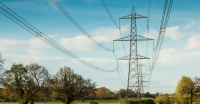
Brexit negotiations should treat energy as ‘special case’
2017/05/14 There are strong practical reasons why the UK and EU should treat energy as a appropriate case during Brexit negotiations, argues a new statement. The statement, jointly authored by Chatham Home, the University of Exeter and the UK Energy Research Centre (UKERC), says finding common ground on energy during the Brexit negotiations would benefit both the UK and remaining EU27, while compromise may be relatively easier to achieve than for other areas.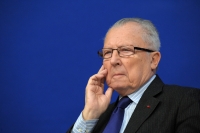
Jacques Delors, former European Commission president, “but they all believe in the Bundesbank.”
2015/08/27 Not all Germans believe in God,” said Jacques Delors, former European Commission president, “but they all believe in the Bundesbank.” There is some truth to this, which is why it is not hard to understand the humiliation felt by the economically orthodox citizens of the bloc’s leading country, as common policies come under attack from national capitals and even from Europe’s own institutions. Talk in German media is of deception, abuse and exploitation, with Berlin losing each battle and its citizens paying a hefty price to keep the eurozone intact. Pressure is mounting at home to push back, to score points in the national interest. Berlin’s ability to resist will be crucial to Europe’s fate.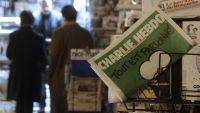
Huge demand expected for Charlie Hebdo issue
2015/01/15 The initial edition of Charlie Hebdo to emerge since the terror attack on the French magazine’s offices is expected to generate record request at the same time as it hits newsstands on Wednesday, defiantly featuring the Prophet Mohammed on its cover.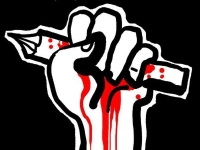
The French government Troops is mobilised as political unity starts to fray
2015/01/14 The French government said it would deploy 10,000 troops to bolster security at vulnerable sites and take other measures to combat Islamist extremism as the political unity displayed since last week’s terrorist attacks began to fray. Jean-Yves Le Drian, defence minister, said the troops would be sent to unspecified points by this evening in a mobilisation he described as incomparable in scale for domestic duties. The authorities as well sent 5,000 police officers to protect Jewish schools and synagogues.
- France News
-
- FRANCE: Aluminium-Lithium Alloys Fight Back
- AFGHANISTAN: UNWTO: International tourism – strongest half-year results since 2010
- IRAN: Peugeot-Citroen lifted by Iran sales
- ALBANIA: US LNG exports make European market more competitive
- FRANCE: France and Italy quarrel over shipyard and Libya
- FRANCE: Bastille Day Military Parade - Paris Macron shaking hands with Donald Trump's wife Melania
- Trending Articles
-
- SOUTH AFRICA: Nigeria and South Africa emerge from recession
- BAHRAIN: Bahrain issues new rules to encourage fintech growth
- UZBEKISTAN: Former deputy PM named Uzbekistan Airways head
- ARUBA: Director of Tourism Turks and Caicos after Irma: Tourism, visitors, hotels current status
- AUSTRALIA: Western Australia joins two-thirds of country to ban fracking
- ANGOLA: Angola: Elections / 2017 - Provisional Data Point Out Qualified Majority for MPLA










